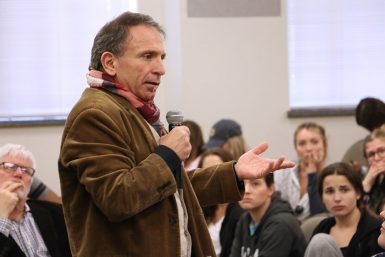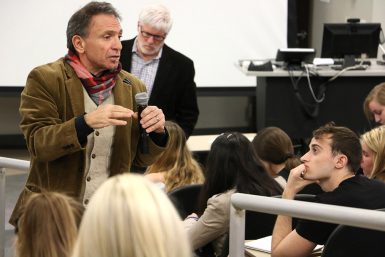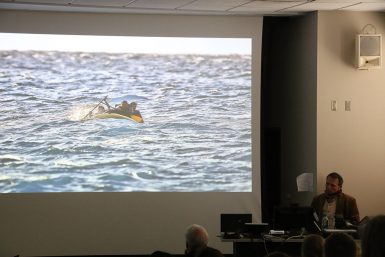Reuters photojournalist Behrakis ‘collects experiences’

According to Yannis Behrakis, a journalist’s job is simply collecting experiences and sharing them with the rest of the world.
A prize-winning and widely acclaimed photographer for Reuters, Behrakis does this on a daily basis. Over the past 20 years, he has traveled to some of the world’s most dangerous places in an effort to shed light on global crises, and he continues to collect experiences that would otherwise go unheard.
“A lot of times, when you’re out there reporting the news, people see you as a life vest,” Behrakis said. “They see you as their only chance, as somebody who can help them, hoping that justice will prevail.”
Monday, Behrakis shared his own experiences as well as some of his most moving photographs with students in professor of practice Tom French’s Behind the Prize class. French brings winners and finalists of top awards to campus to talk to students about their work.
Among his many honors, Behrakis was honored by The Guardian as photographer of the year in 2015. The newspaper cited “the most astonishing moments he captured in two of the biggest stories of 2015 – the refugee crisis and the financial implosion in his home country Greece.”
Throughout his talk, Behrakis emphasized communication and his style of personal reporting.

“Sometimes, you go to do a story and there are some other journalists beforehand who did the story the ugly way, in a really not nice way, or in a negligent way,” Behrakis said. “The way I work is I take things personally. I want to do something, and I want to be the one who helps. I want to be the good guy. I believe I’m the good guy.”
Occasionally, he has had to convince others of this. When he was in South Africa covering Nelson Mandela’s funeral, Behrakis arrived at the burial site and was testing lighting and setting up the shoot when a solider pointed his gun at him and asked him what he was doing. He said, “I’m collecting experiences.”
“The soldier asked what I do with them,” Behrakis recalled. “I said, ‘I share them with the rest of the world.’”
More recently, he has spent time in Greece covering the refugee crisis. To date, nearly 1 million refugees have passed through Greece.

“I must say, I’m proud of the way Greeks dealt with the crisis,” Behrakis said. “It showed that humanity is still alive and kicking in Greece, and I’m hopeful it can be a message to the rest of the world.”
Behrakis addressed the danger in global reporting. He dedicated his talk to a friend who died covering elections in Afghanistan exactly two years ago on the date Behrakis spoke to the class. Before 2000, only one Reuters staffer had died on the job; since then, 20 have been killed.
Still, showing people events of the world is critical.
“What we do really matters,” he said. “We have a lot of power in our cameras and our hands.”
Additional reporting by Marah Harbison.

